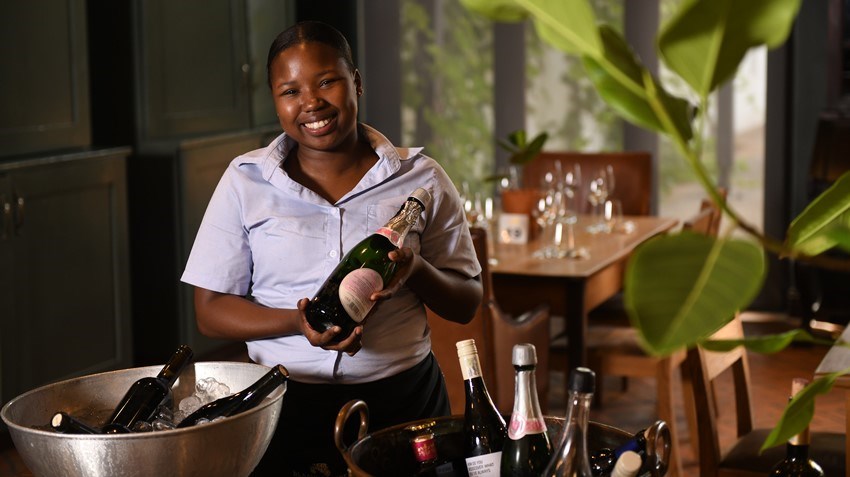Nieuwoudt is wine tourism manager for Vinpro that represents 2 500 of the country’s wine producers, cellars and industry stakeholders.
Speaking ahead of the Wine & Food Tourism Conference at Spier near Stellenbosch on 18 September, that she will be attending, she said she was looking forward to sharing ideas and case studies with speakers and delegates. “I see the conference as a key resource for progressing ideas, testing concepts and getting feedback from some of the best in the business. One area I’m keen to discuss is how best to accelerate the switch in local mindset from day-tripping to longer stays in many of our wine-growing regions.
“Currently, up to 70% of visitors to South Africa’s wine routes are domestic travellers. Instead of exploring the wineries at a leisurely pace, they tend to focus on one or two activities that they sandwich between the drive there and back. Not only are they limiting their enjoyment, but they are curtailing opportunities for tourism providers.
“Part of the reason for their choosing an excursion rather than an overnight stay is the cost of accommodation. I’m glad to say the industry is exploring the development of modestly priced alternatives in the smaller towns and on farms to give people a greater incentive to stay over. This obviously has advantages for the local restaurants and hospitality staff.

“In the desire to cultivate international custom, which of course is critical to the continued success of our industry, we sometimes tend to overlook the opportunities right in front of us. Local visitors are most likely to be repeat visitors. They are also likely to be able to travel outside of high season times, thus potentially generating a steadier, year-round income flow for tourism providers.”
She said that pricing accommodation around R1 000 a couple per night was also a good way to entice return travellers to the Winelands to explore some of the lesser-known areas. “This applies not only to the domestic market but also to international travellers. If they can be convinced to return to the country to experience newer areas at favourable rates, more levels of the value chain stand to benefit.
“We offer such diversity of landscape, terroir, hospitality, experiences, people and stories which are designed to appeal to connoisseurs as well as enthusiasts and novices. Why not retain a focus on those visitors whom we can readily access and whom we already know are receptive to our offerings? It’s an opportunity to deepen relationships.
“Take Namibia as an example. More than 80% of travellers from Namibia to the Western Cape are repeat visitors. There is so much we can do to induce them to spend more time with us and at more frequent intervals. This is not to say we should be overlooking or ignoring travellers from elsewhere on the continent or around the world. Our three biggest international markets are the UK, Germany and the US. Let’s continue to cultivate these visitor streams and grow the opportunities they offer but let’s also look closer to home.”
She said that in addition to the widely recognised quality and value offered by South Africans in the wine industry, the country’s emphasis on eco- and social sustainability across the value chain stood it in good stead with travellers worldwide.
“We have excellent eco and socially sustainable credentials, thanks to well-established and continually improving climate mitigating and social upliftment policies. With sustainability increasingly informing the buying decisions of wine lovers, South Africa is well placed to assure them of production integrity across the value chain, now that two-thirds of the country’s wine grape crop is produced under ethical conditions by Wine and Agricultural Ethical Trade Association (WIETA) accredited producers.
“Based on global trends, we’ll soon need to include sustainability credentials, from biodynamic or organic farming, and more. It’s a topic I’m looking forward to debating with my fellow-delegates at the conference.”
About the Wine & Food Tourism Conference:
More than 15 top-level experts will be sharing the stage at the Wine & Food Tourism Conference at Spier on 18 September. High-profile personalities include trends analyst Dion Chang, digital expert Judith Lewis from the UK, Wesgro CEO Tim Harris, as well as immediate past Minister of Tourism Derek Hanekom.
Delegates will also get to witness the announcement of the honourees of the inaugural Wine & Food Tourism Awards. It will be presented by South Africa’s National Minister of Tourism, Mmamoloko Kubayi-Ngubane. Wine, food and hospitality establishments will be highlighted in three distinct categories: Innovation, Service Excellence and The Authentic South African Experience.
Go to www.wineandfood.co.za for more information, and to register for the conference.
The theme of this year’s conference is “Trends in Wine and Food Tourism”.
Conference rates:
- Regular price: R3 800 plus 15% VAT
- Student price: R1 750 plus 15% VAT
Special offer! When you register at full rate for this year’s conference, you now have the opportunity to bring a junior staff member along at no additional cost. This is an excellent opportunity for those in mentorship positions to expose their mentees to all that’s hot and happening in the wine and food tourism sector, and to learn first-hand from wine and food tourism experts in their respective fields.
Social media:
Twitter and Facebook: @winefoodconf
Instagram: @winefoodtourismconf
Hashtag: #wfconf2019